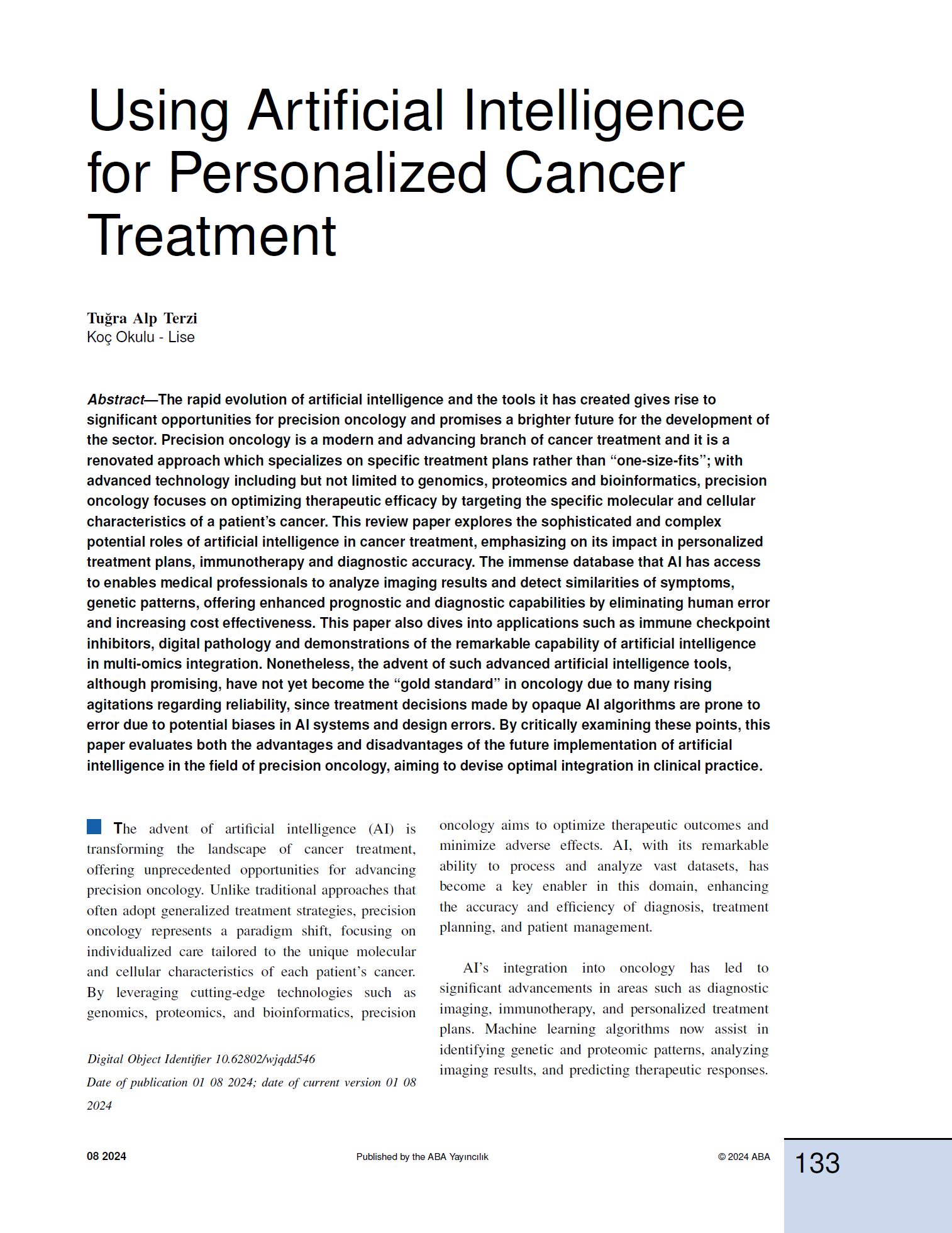Using Artificial Intelligence for Personalized Cancer Treatment
DOI:
https://doi.org/10.62802/mpfsy492Keywords:
Artificial intelligence, immunotherapy, precision oncology, personalized cancer treatment, genomics, proteomics, bioinformatics, diagnostic accuracy, multi-omics integration, digital pathology, immune checkpoint inhibitors, AI-driven diagnostics, healthcare innovation, cost-effectiveness, algorithmic bias, clinical implementationAbstract
The rapid evolution of artificial intelligence and the tools it has created gives rise to significant opportunities for precision oncology and promises a brighter future for the development of the sector. Precision oncology is a modern and advancing branch of cancer treatment and it is a renovated approach which specializes on specific treatment plans rather than “one-size-fits”; with advanced technology including but not limited to genomics, proteomics and bioinformatics, precision oncology focuses on optimizing therapeutic efficacy by targeting the specific molecular and cellular characteristics of a patient's cancer. This review paper explores the sophisticated and complex potential roles of artificial intelligence in cancer treatment, emphasizing on its impact in personalized treatment plans, immunotherapy and diagnostic accuracy. The immense database that AI has access to enables medical professionals to analyze imaging results and detect similarities of symptoms, genetic patterns, offering enhanced prognostic and diagnostic capabilities by eliminating human error and increasing cost effectiveness. This paper also dives into applications such as immune checkpoint inhibitors, digital pathology and demonstrations of the remarkable capability of artificial intelligence in multi-omics integration. Nonetheless, the advent of such advanced artificial intelligence tools, although promising, have not yet become the “gold standard” in oncology due to many rising agitations regarding reliability, since treatment decisions made by opaque AI algorithms are prone to error due to potential biases in AI systems and design errors. By critically examining these points, this paper evaluates both the advantages and disadvantages of the future implementation of artificial intelligence in the field of precision oncology, aiming to devise optimal integration in clinical practice.
References
Alzamily, J. Y., Bakeer, H., Almadhoun, H., Abunasser, B. S., & Abu-Naser, S. S. (2024). Artificial Intelligence in Healthcare: Transforming Patient Care and Medical Practices.
Bilgin, G. B., Bilgin, C., Burkett, B. J., Orme, J. J., Childs, D. S., Thorpe, M. P., ... & Sartor, O. (2024). Theranostics and artificial intelligence: new frontiers in personalized medicine. Theranostics, 14(6), 2367.
Das, A. B. (2024). Network medicine and artificial intelligence in cancer precision therapy: path to prevent drug-induced toxic side effect. Current Opinion in Toxicology, 100476.
El Jerjawi, N. S., Murad, W. F., Harazin, D., Qaoud, A. N., Jamala, M. N., Abunasser, B. S., & Abu-Naser, S. S. (2024). The Role of Artificial Intelligence in Revolutionizing Health: Challenges, Applications, and Future Prospects.
Khalighi, S., Reddy, K., Midya, A., Pandav, K. B., Madabhushi, A., & Abedalthagafi, M. (2024). Artificial intelligence in neuro-oncology: advances and challenges in brain tumor diagnosis, prognosis, and precision treatment. NPJ Precision Oncology, 8(1), 80.
Rath, K. C., Khang, A., Rath, S. K., Satapathy, N., Satapathy, S. K., & Kar, S. (2024). Artificial intelligence (AI)-enabled technology in medicine-advancing holistic healthcare monitoring and control systems. In Computer Vision and AI-Integrated IoT Technologies in the Medical Ecosystem (pp. 87-108). CRC Press.
Sherani, A. M. K., Khan, M., Qayyum, M. U., & Hussain, H. K. (2024). Synergizing AI and Healthcare: Pioneering Advances in Cancer Medicine for Personalized Treatment. International Journal of Multidisciplinary Sciences and Arts, 3(1), 270-277.
Shiwlani, A., Khan, M., Sherani, A. M. K., Qayyum, M. U., & Hussain, H. K. (2024). REVOLUTIONIZING HEALTHCARE: THE IMPACT OF ARTIFICIAL INTELLIGENCE ON PATIENT CARE, DIAGNOSIS, AND TREATMENT. JURIHUM: Jurnal Inovasi dan Humaniora, 1(5), 779-790.
Wu, X., Li, W., & Tu, H. (2024). Big data and artificial intelligence in cancer research. Trends in cancer, 10(2), 147-160.
Yu, G., Zhang, Z., Eresen, A., Hou, Q., Amirrad, F., Webster, S., ... & Zhang, Z. (2024). Predicting and Monitoring Immune Checkpoint Inhibitor Therapy Using Artificial Intelligence in Pancreatic Cancer. International Journal of Molecular Sciences, 25(22), 12038.









